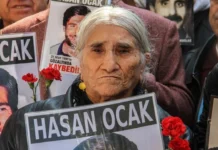An inmate in Turkey’s southeastern Iskenderun T-Type Prison has appealed to the Human Rights Association (IHD), saying he is at risk of losing his foot if he does not receive medical treatment immediately, the Duvar news website reported.
The inmate, identified only by his initials Ş.Y., said he suffered from Buerger’s disease, which affects blood vessels and prevents blood flow causing clots to form. Mehtap Sert, a lawyer from the IHD, said they visited Ş.Y. and discovered he was suffering from blood clots in his foot.
“Ş.Y. was given medication, but the clots in his foot got worse,” she said. “Now the foot is at risk of developing gangrene.”
According to Sert, Ş.Y. is not the only inmate suffering from a lack of medical care in the Iskenderun prison. Many inmates complain their illnesses are not taken seriously and they’re not taken to the hospital.
Sert pointed out that 33-year-old Bangin Muhammed, who suffered from multiple health problems, died in the same prison from a lack of proper healthcare on November 12, 2021.
Ismail Tamboğa dropped to 35 kilograms and was diagnosed with stomach ulcers. However, the diagnosis was made far too late, and Tamboğa was not put on a diet tailored to his condition. He was later transferred to Diyarbakir Prison with the help of lawyers from the IHD.
“Everyone deserves proper medical care, regardless of their crime,” Sert said. “Everyone has a right to life, therefore, S.Y. and other sick inmates should immediately get necessary medical attention and treatment.”
Human rights activists and opposition politicians have frequently criticized authorities for not releasing critically ill prisoners so they can seek proper treatment.
According to the Human Rights Association (İHD), as of June 2020 there were more than 1,605 sick inmates in Turkish prisons, approximately 600 of whom were critically ill. Although most of the seriously ill patients had forensic and medical reports deeming them unfit to remain in prison, they were not released. Authorities refuse to free them on the grounds that they pose a potential danger to society. In the first eight months of 2020, five critically ill prisoners passed away because they were not released in time to receive proper medical treatment.















